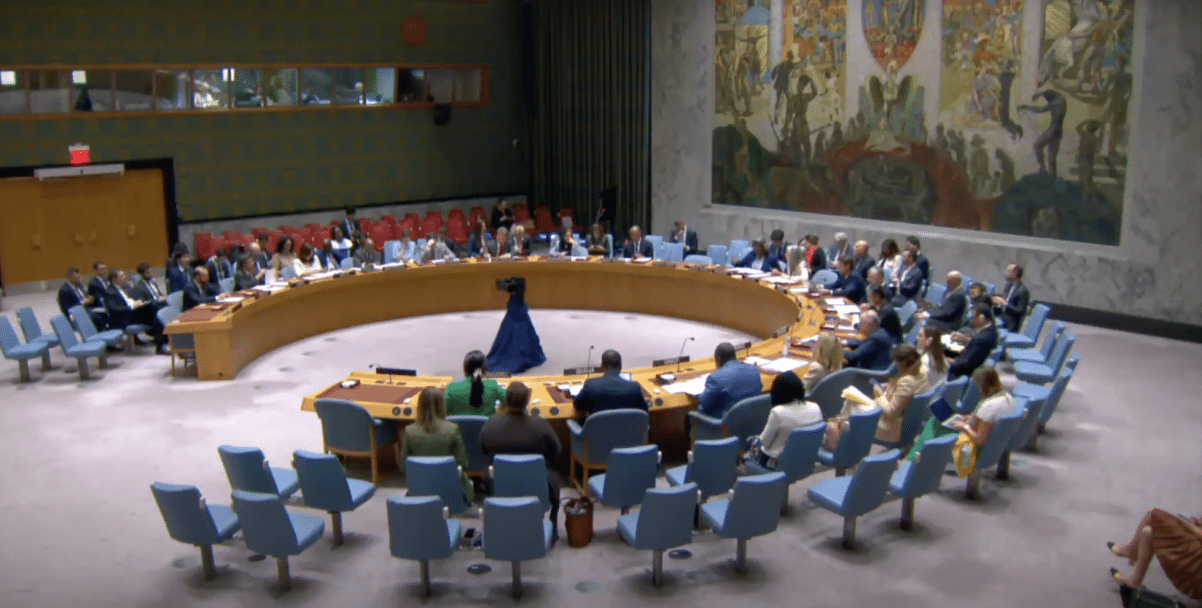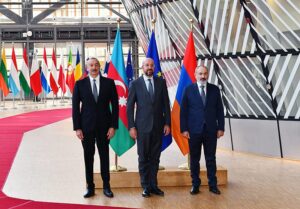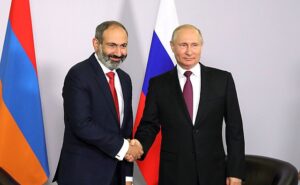Photo: UN Security Council meeting on the Lachin Corridor, YouTube/United Nations
Nagorno-Karabakh is internationally mostly recognised as part of Azerbaijan. However, as most inhabitants identify themselves as Armenian and the region is locally governed by Armenian authorities, Armenia also claims the region. These ethnic tensions have already led to two full-scale bloody wars. Ever since, Armenia and Azerbaijan have been part of a peace process guided by Russia, including a ceasefire which is meant to be enforced by Russian peacekeepers. However, the ineffectiveness of these measures have been painfully evident as deathly ceasefire violations have been rule rather than exception.
For the past months, inhabitants of the Nagorno-Karabakh region have been suffering under a humanitarian crisis, as Azerbaijan has been blocking all supplies, including humanitarian aid, from having access to the region, through a blockade of the Lachin corridor, the main access road connecting Nagorno-Karabakh with Armenia and the rest of the world. For an in-depth discussion of the aforementioned developments, read our previous article on the Nagorno-Karabakh crisis.
This article will examine the recent developments regarding the Lachin corridor, which have led to conflicting accounts: some changes spark concerns, while others show some signs of hope.
(Limited) efforts of the international community
On the 7th of August, a group of United Nations experts issued a statement in which they recognised the humanitarian crisis in Nagorno-Karabakh and voiced concerns. Five days later, the Armenian ambassador to the UN urged the UN Security Council to hold an emergency meeting because Nagorno-Karabakh is “on the verge of a full-fledged humanitarian catastrophe.” Not much later, an emergency meeting did take place, but it seems to have had little impact. Eurasianet reported that “While France, the UK, and the U.S. all urged Azerbaijan to abide by a February ruling from the International Court of Justice ordering the country to provide free movement at the Lachin road, the council failed to issue any statement or resolution.”
Furthermore, during the meeting, the EU Council President, alongside Russia, backed the proposal of the Azerbaijani ambassador to the UN to provide humanitarian aid through Aghdam, a city in Azerbaijan. This offer is far from satisfactory and rather problematic. Earlier, in response to this offer, the president of the Armenian local government in Nagorno-Karabakh said that “Azerbaijan created this crisis and cannot be the solution to it.” EU’s High Representative Josep Borrell also stated that he is aware of these Azerbaijani offers but that they “should not be seen as an alternative to the reopening of the Lachin corridor.”
The failure of the UN security council to make any real progress on the crisis is reflective of the overall trend of the international community: although many concerns have been voiced about the blockade of the Lachin corridor, any real penalties, such as sanctions, have not been imposed on Azerbaijan.
An ongoing humanitarian crisis
The weak attitude of the international community is even more distressing when looking at the increasingly painful reality of the inhabitants of Nagorno-Karabakh. On the 16th of August, Gegham Stapanyan, the region’s Ombudsman, announced that “a case of death from starvation has been recorded,” as a 40-year-old man had passed away “due to chronic malnutrition and protein-energy malnutrition.” Furthermore, an Armenian human rights defender reported that there has also been “a case of the death of an unborn child due to the impossibility of an ambulance arriving – there was no fuel.” Unfortunately, deaths of unborn babies are happening more frequently: a Karabakh Armenian doctor said that “miscarriages have tripled as a result of malnutrition and a lack of medical care.”
As vital supplies remain blocked from entering the region, the humanitarian crisis in Nagorno-Karabakh does not seem anywhere close to de-escalating.
Hopeful developments?
Thankfully, there seem to be some signs of potential optimism, due to speculation of a possible deal. This speculation follows the sudden permission for at least 60 Armenian inhabitants of Nagorno-Karabakh to leave the region for Armenia on the 21st and the 22nd of August, through a partial lifting of the blockade of the Lachin corridor. According to an Armenian opposition media outlet, the Armenian authorities of Nagorno-Karabakh have agreed with Azerbaijan to use the aforementioned Aghdam road for the delivery of humanitarian aid. However, the advisor to the President of Nagorno-Karabakh said that such a move could only be made if linked to the opening of the Lachin corridor. The Armenian media outlet also reported that Azerbaijani and Armenian representatives would soon have a bilateral meeting, which might also indicate serious talks of an agreement.
Furthermore, on the 24th of August, the Armenian Prime Minister, when addressing the cabinet, also stated that he has “received reliable information that plans are being developed to unilaterally open the Lachin corridor; that is, to allow exit from Nagorno-Karabakh and not to allow entry.” While this potential move might appear to be good news for inhabitants of Nagorno-Karabakh, who might be able to finally leave the region for Armenia, it is still reflective of the Azerbaijan’s inhumane strategy: as many ethnic Armenian inhabitants will want to leave Nagorno-Karabakh, Azerbaijan has the possibility of regaining control over the region, meaning that it has carried out a tactical process of making living conditions in Nagorno-Karabakh miserable enough for ethnic Armenians to ‘finally’ leave.
Regardless of which outcome the current developments regarding Nagorno-Karabakh might lead to, it is evident that Azerbaijan deserves the international condemnation it deserves. The country has initiated a humanitarian crisis for its own political gains. It has led to a risk of genocide by wanting the inhabitants of Nagorno-Karabach to ‘starve into submission’. It is using a deadly humanitarian crisis as a weapon. As Russia’s peacekeepers are clearly ineffective, other international powers have the duty to use their bargaining power and hold Azerbaijan accountable.
Written by Luna Sent



